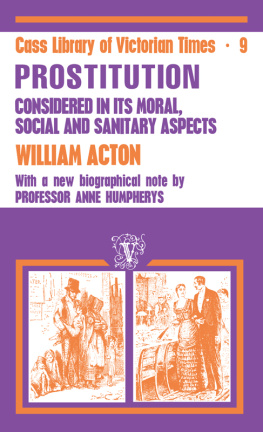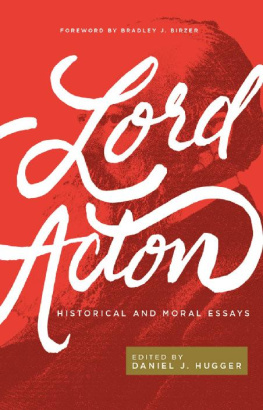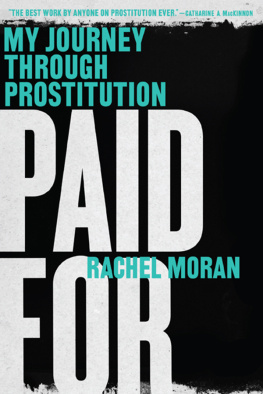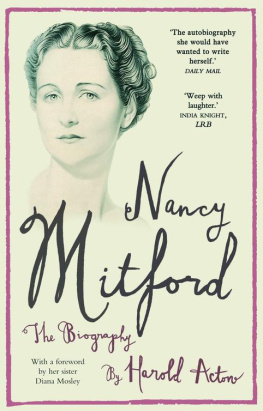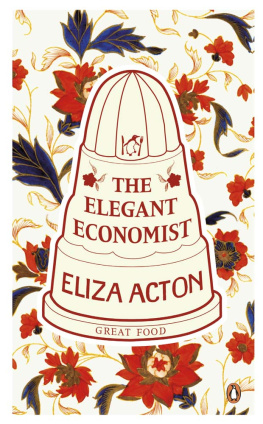Published by
Routledge
This edition published by Routledge
2 Park Square, Milton Park, Abingdon, Oxon, 0X14 4RN
711 Third Avenue, New York, NY 10017
Routledge is an imprint of the Taylor & Francis Group, an informa business
Distributed in the United States by
International Scholarly Book Services, Inc.
Beaverton, Oregon 97005
Library of Congress Catalog Card No. 75-171265
ISBN: 978-0-714-62414-3
ISBN: 978-1-136-26798-7
First edition | 1857 |
Second edition | 1870 |
Reprint of Second edition with a new biographical note | 1972 |
Transferred to Digital Printing 2006
Publishers Note
The publisher has gone to great lengths to ensure the quality of this reprint but points out that some imperfections in the original may be apparent
Biographical Note
William Acton was a man of science whose specializationthe study of human sexualitywas an unmentionable subject for most Victorians. Paradoxically, Acton himself was very Victorian in many of his attitudes, believing, for example, that masturbation led if carried far enough, to early death or self-destruction (The Functions and Disorders of the Reproductive Organs). Nevertheless, he insisted, frequently with the zeal of a social reformer rather than that of a doctor, that the results of officially ignoring the sexual drive in men were not in the best interests of society. I am, he says in his Preface to the Second Edition of Prostitution, an advocate of RECOGNITION. I propose to show that concentrated effort, sanctioned by authority, can alone stay the ravages of a contagious and deadly disorder, and that only by methodical and combined action, and by gradual and almost imperceptible stages, can any moral cure be effected. Thus, his great work on prostitution is a combination of scientific observation and analysis, sound social criticism, and open propaganda, a compound not untypical of the best Victorian social documents.
Acton had an excellent background to prepare him for this work. He was born in 1814, the second son of a clergyman in Shillingston, Dorset. At 17, he went to London to begin his studies for a medical career, and was an articled pupil of Charles Wheeler, the apothecary to St. Bartholomews hospital, until 1835, when he went to Paris to serve as an externe (a non-student) at the womens venereal hospital in Paris. During this period he laid the scientific foundations for his life-long subject of research, studying under one of the foremost men in the field of venereology, Philippe Riccord. Acton served as Secretary of the Parisian Medical Society in 1839.
In 1840, he returned to London, becoming a member of the Royal College of Surgeons, and building up a fashionable practice in George Street, Hanover Square until 1843, and in Queen Anne Street in Cavendish Square thereafter. In 18451846, he served as surgeon to the Islington Dispensary. Until his death in 1875, he was an active writer of articles on a variety of medical problems, by far the largest number dealing with the physical and social problems related to venereal diseases. Some of these articles were reports of observations on social problems, such as Observations on illegitimacy in the London parishes of St. Marylebone, St. Pancras, and St. Georges, Southwark during the year 1857 (Journal of the Statistical Society, 1859). Others dealt with medical questions such as On the best means of disguising the taste of nauseous medicines (Lancet, 1846). Some articles are tantalizingly unclassifiableChild-murder and wet-nursing (British Medical Journal, 1861).
Actons first book, A practical treatise on diseases of the urinary and generative organs, was published in 1841. His most popular work was The Functions and Disorders of the Reproductive Organs, in Childhood, Youth, Adult Age, and Advanced Life, Considered in their Physiological, Social, and Moral Relations, first published in 1857, and reaching a sixth edition in 1875. For the modem reader, however, Actons greatest work is rather his expansively titled Prostitution, Considered in its Moral, Social and Sanitary Aspects, in London and Other Large Cities: with Proposals for the Mitigation and Prevention of its Attendant Evils, published in 1857 but substantially revised for the second edition in 1870.
The differences between The Functions and Disorders and Prostitution are instructive. In The Functions and Disorders of the Reproductive Organs, described by Steven Marcus as part fantasy, part nightmare, part hallucination, and part madhouse (The Other Victorians, p. 13), Acton tried to give scientific justification to the prevailing attitude to masturbation and sexual intercourse, namely that, to quote Marcus again, sex is a universal and virtually incurable scourge (op. cit., p. 28). But in Prostitution, Acton aimed to attack rather than support prevailing ideas about sex, to inculcate a more humane and reasonable response to a social problem which he knew did not improve with ignorance. Among other pet Victorian assumptions, Acton attacked the belief that all prostitutes end up destitute and brutalized. I prove, he says in the Preface, that the great mass of prostitutes in this country are in the course of time absorbed into the so-called respectable classes. Though Actons work was favourably received by the press when it appeared, such home truths were perhaps too strong for the book to be acceptable to the general Victorian reader. It is just this quality of honest observation, however, as well as Actons insistence that the problem must be faced, which ensures the books continuing interest for the modern reader. It proves to us once again that the complex Victorians defy generalization.
PROSTITUTION,
CONSIDERED IN
ITS MORAL, SOCIAL, AND SANITARY ASPECTS,
IN
London and Other Large Cities and Garrison Towns.
WITH
PROPOSALS FOR THE CONTROL AND PRETENTION OF ITS ATTENDANT EVILS.
BY WILLIAM ACTON, M.R.C.S.
Preface.
TWELVE years have elapsed since I submitted to public consideration the first edition of this work. I entered upon my labours with feelings far different from those which induce me to resume them. Then, the attempt to rouse attention to a question that seemed to myself one of national importance, appeared almost hopeless. Now, the mind and conscience of the nation are awakened, and opinions which would have been formerly dismissed as idle dreams, are deemed worthy of serious attention. During the intervening period prostitution, with its attendant evils, has been the subject of anxious inquiry. In 1864 the Secretary of State for War, and the Board of Admiralty, appointed a Committee to report on the best means of protecting the army and navy from the ravages occasioned by venereal disease, and in 1866 an Act having this end in view now well known as the Contagious Diseases Act of 1866 passed through the legislature. The results achieved by means of this Act, and the subject of prostitution generally, have also been reported on by two Select Parliamentary Committees one of the House of Lords, in 1868, the other of the House of Commons, in 1869, and the legislature has seen fit to extend the scope of the Act of 1866, by an Act of the last session (32 and 33 Vic. c. 96). The working of this Act, and the public attention called to the subject, has been attended with the happiest results, both as regards the health of our army and navy, and the sanitary and moral improvement wrought in the unhappy women who have come within the scope of its provisions. So much so, that we read in the report of the above-mentioned Committee of the House of Commons :



